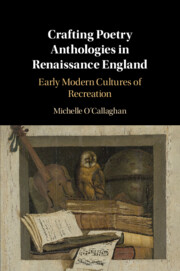Book contents
- Crafting Poetry Anthologies in Renaissance England
- Crafting Poetry Anthologies in Renaissance England
- Copyright page
- Contents
- Illustrations
- Acknowledgements
- Note on the text
- Introduction
- Chapter 1 Books in Process
- Chapter 2 Household Books
- Chapter 3 ‘To the Gentleman Reader’
- Chapter 4 ‘Impos’d designe’
- Chapter 5 A Poetical Rapsody
- Conclusion
- Bibliography
- Index
Chapter 1 - Books in Process
Songes and Sonettes and Paradyse of Daynty Devises
Published online by Cambridge University Press: 23 December 2020
- Crafting Poetry Anthologies in Renaissance England
- Crafting Poetry Anthologies in Renaissance England
- Copyright page
- Contents
- Illustrations
- Acknowledgements
- Note on the text
- Introduction
- Chapter 1 Books in Process
- Chapter 2 Household Books
- Chapter 3 ‘To the Gentleman Reader’
- Chapter 4 ‘Impos’d designe’
- Chapter 5 A Poetical Rapsody
- Conclusion
- Bibliography
- Index
Summary
Songes and Sonettes and Paradyse of Daynty Devises are often characterised as illustrating the scribal origins of poetry anthologies, how ‘the poetic exchanges of manuscript culture’ were replicated in ‘printed form’ to produce simulacra of the gentleman’s miscellany. Songes and Sonettes is said to emerge out of elite scribal communities affiliated with Sir Thomas Wyatt and Henry Howard, Earl of Surrey, while Paradyse of Daynty Devises has its origins in the personal miscellany of Richard Edwards. Both, however, have much more complicated social and cultural lives than this suggests. Two of the most popular early poetry anthologies, they went through various stages of compilation, both in manuscript and in print, and had long shelf lives, spanning around three decades: Songes and Sonettes went into at least twelve editions from 1557 until 1587, and Paradyse at least ten, published from 1576 until 1606. Like many other anthologies, these were books in process, with poems added, removed, and reorganised across different iterations. As a result, the task of attributing the compilation and editing of these anthologies to any one set of agents, working within either scribal cultures or the milieu of the printing house, is fraught with difficulties. The aim of this chapter is therefore not to trace the origins of either Songes and Sonettes or Paradyse to Tudor networks, or to identify who was ultimately responsible for editing either anthology. Instead, the first half of this chapter will examine how publishers and others working in the print trade intervened in these wider processes of production to articulate the corporate values of their craft and to shape the meanings of these anthologies. The publishers of Songes and Sonettes and Paradyse, Richard Tottel and Henry Disle, use the front of each book to set out an ethos of publication that provides the framework for representing their own roles in bringing the poems gathered in these anthologies to a wider public. Both draw on civic humanist vocabularies to establish the credit that is due to the work of publication and to argue that it is the moral responsibility of stationers to facilitate textual transmission for the good of the commonwealth. This task necessitated fashioning classes of readers of ‘all estates’, in the words of the title-page of the 1578 edition of The Paradyse of Daynty Devises, capable of profiting from the recreative properties of the books they produced. To this end, these anthologies were designed to be handy books, and various tools and schema were introduced to organise poetic matter and to make these anthologies available for future use and reuse. In this way, Songes and Sonettes and Paradyse of Daynty Devises participate in a civic Renaissance, in which humanism extends beyond the ambit of the court to fashion other communities and to incorporate the middling sort in the fashioning of an English vernacular poetics.
- Type
- Chapter
- Information
- Crafting Poetry Anthologies in Renaissance EnglandEarly Modern Cultures of Recreation, pp. 20 - 72Publisher: Cambridge University PressPrint publication year: 2020



